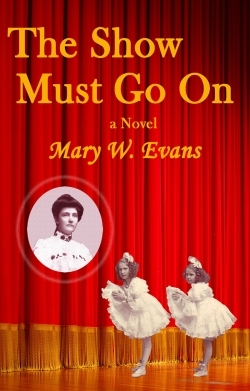The Show Must Go On
Then she saw them—the face masks on the wall—the late afternoon sun streamed through the window and illuminated the smile, while the frown was cast in dark shadow…Maggie imagined her girls performing. She had always loved those happy and sad symbols of the theater.
Throughout the years, Maggie finds a correlation between her life and the happy and sad masks on her wall.
Maggie married young and now she’s a farmer’s wife. When the opportunity arrives to start her daughters, Lovella and Gertrude, in dance classes, she sees a way to live out her dreams through them. She may be tied by society to the role of submissive wife but she knows what she wants and will stop at nothing to realize her goals.
Walt, her husband, wants nothing more than to have his wife and children with him. Although he tries to compromise with Maggie on many issues, his pride demands that he provide for his family. Even when the girls start achieving success, he swears never to touch their money.
Caught in the all-too-human struggle to pursue a dream no matter the cost, and the tight confines of the early 1900s where a husband’s word was law, Maggie pushes Walt and her girls to sublimate their own personal desires. As the marriage unravels and the girls grow up, Maggie continues to put her desires above everything else.
Filled with scenes from their vaudeville life on the road, the reader is confronted with the contrast: the excitement of the theater versus the drudgery of keeping house in the days before modern conveniences.
Mary Evans’ characters awaken emotional responses in each other and in her readers, whether it is empathy or anger. Walt is no match for Maggie’s resolve. Even so, she relies on his strength of character and dependability. As Lovella and Gertrude grow up, they fight to live their own lives while trying to please their mother. The year she keeps them on the road and away from home on Christmas is a disappointment they never forget.
The Show Must Go On is a commentary on life when personal goals are at war with those of the family unit. Evans portrays Walt, Maggie, and the girls as multi-dimensional characters who struggle to keep peace within the family while pursuing their own paths. The novel presents the question of whether or not the price of success is worth the cost.
Evans created a novel with a strong plot that flows smoothly. The story’s realistic setting—both time and place—attests to the amount of research and knowledge involved. Evans’ use of actual photographs adds a sense of authenticity to the era. The Show Must Go On is the kind of story that draws readers in and keeps them turning pages.
Reviewed by
Pat McGrath Avery
Disclosure: This article is not an endorsement, but a review. The publisher of this book provided free copies of the book and paid a small fee to have their book reviewed by a professional reviewer. Foreword Reviews and Clarion Reviews make no guarantee that the publisher will receive a positive review. Foreword Magazine, Inc. is disclosing this in accordance with the Federal Trade Commission’s 16 CFR, Part 255.

